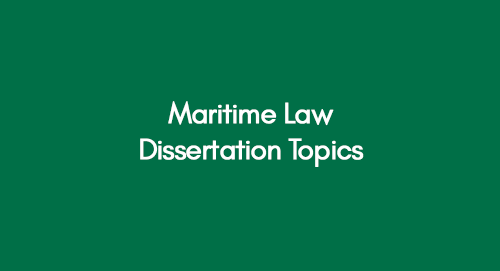
15 Interesting Biology Research Topics | Free Dissertation Ideas With Research Aims
April 19, 2023
15 Amazing Risk Management Dissertation Topics For Students
April 26, 2023Maritime law is a body of law that regulates activities regarding water bodies. It covers various aspects related to maritime activities, including shipping, navigation, marine pollution, fisheries, and offshore oil and gas exploration, among others. Topic selection for maritime law dissertations can be challenging for you. We offer dissertation writing help and provide a list of trending maritime law dissertation topics for your convenience.
Premier Dissertations has made a list of some trending dissertation topics in maritime law for 2025.
Employment Law Dissertation Topics | Commercial Law Dissertation Topics
Get 3+ Free Custom Topics within 24 hours;
List of Maritime Law Research Topics for 2025
Topic 1: Examining the Legal Framework for Maritime Cybersecurity: Challenges and Solutions for Securing Maritime Infrastructure
Research Aim: To analyse the legal and regulatory frameworks governing maritime cybersecurity, identifying gaps and proposing solutions to enhance the resilience of maritime infrastructure against cyber threats. This study will employ a qualitative research methodology, conducting interviews and surveys of maritime industry stakeholders, cybersecurity experts, and legal scholars to assess the effectiveness of current cybersecurity measures and explore potential regulatory reforms.
Topic 2: Enforcing Environmental Regulations in Maritime Shipping: Legal Strategies for Combating Pollution and Protecting Marine Ecosystems
Research Aim: To evaluate the implementation and enforcement of environmental regulations in maritime shipping, examining the role of international conventions, national laws, and enforcement mechanisms in addressing maritime pollution. This research will utilize a mixed-methods approach, combining quantitative analysis of pollution data and regulatory compliance reports with qualitative interviews of environmental regulators, shipping industry representatives, and legal experts to assess the effectiveness of environmental enforcement measures.
Topic 3: Arbitration and Dispute Resolution in Maritime Law: Challenges and Opportunities for Alternative Dispute Resolution Mechanisms
Research Aim: To analyse the use of arbitration and other alternative dispute resolution mechanisms in resolving maritime disputes, evaluating their effectiveness in providing efficient and equitable resolution of maritime conflicts. This study will employ a comparative legal analysis, examining the use of arbitration in maritime disputes across different jurisdictions and assessing the advantages and limitations of alternative dispute resolution methods, supplemented by case studies and interviews with arbitration practitioners and maritime law experts.
Topic 4: Legal Implications of Autonomous Vessels in Maritime Law: Addressing Liability, Regulation, and Governance Issues
Research Aim: To investigate the legal and regulatory challenges posed by the development and deployment of autonomous vessels in maritime operations, analyzing liability frameworks, regulatory standards, and governance structures for autonomous maritime technologies. This research will utilize a doctrinal legal research methodology, conducting a comprehensive review of maritime laws and regulations relevant to autonomous vessels, supplemented by case studies and legal analysis of emerging legal issues in autonomous maritime transportation.
Topic 5: Maritime Security and Counter-Piracy Measures: Legal and Operational Strategies for Protecting Shipping Lanes and Seafarers
Research Aim: To assess the effectiveness of legal and operational measures in combating maritime piracy and enhancing maritime security, examining international conventions, naval operations, and private security arrangements in protecting shipping lanes and seafarers. This study will employ a mixed-methods approach, combining quantitative analysis of piracy incidents and security incidents with qualitative interviews of maritime security experts, naval officials, and legal scholars to evaluate the impact of counter-piracy measures and identify best practices for enhancing maritime security.
Topic 6: The Protection of Seafarers' Rights under UK Maritime Law: An Evaluation
Research Aim: The study aims to evaluate the protection of seafarers' rights under UK maritime law. The research examines the legal framework and regulatory mechanisms to protect seafarers' rights in the UK and assesses their effectiveness in practice. It identifies UK seafarers' challenges and suggests ways to enhance their maritime law protection. The methodology for this study involves legal analysis and a quantitative research approach.
Topic 7: The Legal Framework for Maritime Cybersecurity in the United Kingdom: Challenges and Solutions
Research Aim: The study aims to evaluate the legal framework for maritime cybersecurity. The research examines the legal framework and regulatory mechanisms to address cybersecurity threats in the maritime industry. It also assesses their effectiveness in practice. The study adopts a mixed-method approach.
Topic 8: The Effectiveness of the International Convention on Salvage on Modern Maritime Law
Research Aim: The aim of this study is to analyse and explore the legal and policy considerations involved in regulating autonomous ships under UK maritime law. The study methodology involves a comprehensive review of relevant literature and legislation on autonomous ships and UK maritime law.
Topic 9: The Regulation of Autonomous Ships under UK Maritime Law: Legal and Policy Considerations
Research Aim: The aim of this study is to examine the legal challenges related to regulating autonomous ships under UK maritime law and to identify potential solutions to address these challenges. In order to accomplish study goals, this study adopts a mixed-method approach.
Topic 10: The Legal Framework for Piracy and Armed Robbery at Sea: A Comparative Analysis of International and Domestic Maritime Law
Research Aim: The aim of this study is to conduct a comparative analysis of the legal framework for piracy and armed robbery at sea under international and domestic maritime law. The research also analyses the challenges faced by different countries in implementing and enforcing piracy laws and provides recommendations to enhance the effectiveness of the legal framework in controlling piracy and armed robbery at sea. This study uses a mixed-method approach to get the final results.
To Trending Research Topics in Maritime Law
Topic 6: The Protection of Seafarers' Rights under UK Maritime Law: An Evaluation
Research Aim: The study aims to evaluate the protection of seafarers' rights under UK maritime law. The research examines the legal framework and regulatory mechanisms to protect seafarers' rights in the UK and assesses their effectiveness in practice. It identifies UK seafarers' challenges and suggests ways to enhance their maritime law protection. The methodology for this study involves legal analysis and a quantitative research approach.
Topic 7: The Legal Framework for Maritime Cybersecurity in the United Kingdom: Challenges and Solutions
Research Aim: The study aims to evaluate the legal framework for maritime cybersecurity. The research examines the legal framework and regulatory mechanisms to address cybersecurity threats in the maritime industry. It also assesses their effectiveness in practice. The study adopts a mixed-method approach.
Topic 8: The Effectiveness of the International Convention on Salvage on Modern Maritime Law
Research Aim: The aim of this study is to analyse and explore the legal and policy considerations involved in regulating autonomous ships under UK maritime law. The study methodology involves a comprehensive review of relevant literature and legislation on autonomous ships and UK maritime law.
Topic 9: The Regulation of Autonomous Ships under UK Maritime Law: Legal and Policy Considerations
Research Aim: The aim of this study is to examine the legal challenges related to regulating autonomous ships under UK maritime law and to identify potential solutions to address these challenges. In order to accomplish study goals, this study adopts a mixed-method approach.
Topic 10: The Legal Framework for Piracy and Armed Robbery at Sea: A Comparative Analysis of International and Domestic Maritime Law
Research Aim: The aim of this study is to conduct a comparative analysis of the legal framework for piracy and armed robbery at sea under international and domestic maritime law. The research also analyses the challenges faced by different countries in implementing and enforcing piracy laws and provides recommendations to enhance the effectiveness of the legal framework in controlling piracy and armed robbery at sea. This study uses a mixed-method approach to get the final results.
Prime Maritime Law Thesis Topics
Topic 11: The Development of Maritime Law in the United Kingdom: A Historical Analysis
Research Aim: The aim of this maritime law thesis topic is to provide a comprehensive historical analysis of the development of maritime law in the United Kingdom. This study examines the major legal milestones, legislative reforms, and judicial decisions that have shaped UK maritime law over the centuries. This research adopts a logical order, starting with the early history of maritime law in the United Kingdom and progressing to the present day.
Topic 12: The Regulation of Shipping Emissions under UK Maritime Law: Challenges and Solutions
Research Aim: The aim of this maritime law research topic is to critically evaluate the legal framework governing shipping emissions under UK maritime law. The research identifies the challenges the UK faces in regulating shipping emissions and suggests policy recommendations to address these challenges. The methodology for this study involves a combination of legal analysis, empirical research, and policy evaluation.
Topic 13: The Liability of Port Authorities under UK Maritime Law: A Comparative Analysis
Research Aim: The aim of this study is to examine the liability of port authorities under UK maritime law. It also undertakes a comparative analysis of the legal frameworks in other selected countries. The research also identifies port authorities' key challenges in managing their liability and provides recommendations for enhancing their risk management strategies. The methodology for this study involves a combination of legal analysis and comparative law analysis.
Topic 14: The Impact of the Rotterdam Rules on UK Maritime Law: Opportunities and Challenges
Research Aim: The study aims to critically evaluate the impact of the Rotterdam Rules on UK maritime law and to identify the opportunities and challenges presented by this international convention. This research identifies the potential benefits and drawbacks of ratifying the convention and suggests policy recommendations to address any challenges. It adopts a comparative analysis to evaluate the Rotterdam Rules in comparison with other international conventions and legal frameworks.
Topic 15: The Role of UK Admiralty Courts in Resolving Maritime Disputes: A Comparative Study
Research Aim: The study objectives include determining how the UK Admiralty courts handle maritime disputes and assessing other countries' legal frameworks. The research explores the legal principles and precedents that underpin Admiralty courts' jurisdiction and assesses the effectiveness of the current regulatory regime in resolving maritime disputes. The study involves a comparative analysis of the legal frameworks.
Free Online Plagiarism Checker For Students
We will email you the report within 24 hours.
Upload your file for free plagiarism

Get an Immediate Response
Discuss your custom requirements with our writers

























